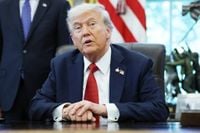On October 6, 2025, the U.S. Supreme Court quietly but decisively rejected an appeal from Ghislaine Maxwell, the British socialite and former companion of Jeffrey Epstein, closing a high-profile legal chapter that has captivated the nation for years. The decision, handed down as the justices opened their new term, means Maxwell’s 20-year prison sentence for sex trafficking and related crimes will stand, despite her defense’s strenuous efforts to overturn the conviction.
According to The Dispatch and Pantagraph, Maxwell’s legal team had pinned their hopes on arguments that a 2007 non-prosecution agreement—struck between federal prosecutors in Miami and Epstein’s attorneys—should have shielded her, as a “potential co-conspirator,” from prosecution anywhere in the country. But the Supreme Court, in keeping with its usual practice, offered no explanation for declining the case. The Manhattan federal appeals court had already ruled the prosecution was proper, and the jury’s verdict, based on harrowing testimony from four women who described being abused as teenagers in the 1990s and early 2000s at Epstein’s various homes, had left little room for ambiguity.
Maxwell’s journey through the U.S. justice system has been nothing short of extraordinary—and fraught with controversy at every turn. After her 2021 conviction for sex trafficking a teenage girl, among other charges, she was initially incarcerated at a low-security federal prison in Florida. But following a high-profile interview in July 2025 with Deputy Attorney General Todd Blanche, she was transferred to a minimum-security prison camp in Texas. Neither the Bureau of Prisons nor Maxwell’s representatives have explained the reason for this move. However, her attorney, David Oscar Markus, who also led her Supreme Court appeal, has remained adamant about her innocence, stating, as reported by The Dispatch, that she “is innocent and never should have been tried, much less convicted.”
The July interview with Blanche was itself unusual: Maxwell was granted limited immunity, allowing her to speak freely about the case, so long as she avoided making false statements. This immunity was designed to encourage candor, but it also fed the rumor mill, especially among conspiracy theorists and political partisans eager for any sign of a cover-up or political intrigue.
Much of the public’s fascination with the Maxwell case stems from its close association with Jeffrey Epstein, the disgraced New York financier whose 2019 arrest on sex trafficking charges set the stage for a series of legal and political firestorms. Epstein’s death a month later in a Manhattan jail cell, officially ruled a suicide, only intensified suspicions and speculation. According to Pantagraph, the FBI and Justice Department’s July 2019 announcement that Epstein had killed himself did little to quell conspiracy theories, especially after it was revealed that a rumored “client list”—once said by Attorney General Pam Bondi to be on her desk—did not actually exist. The Justice Department later confirmed that no further documents from the investigation were suitable for public release.
The Trump administration, which had been under fire from both critics and supporters for its handling of the Epstein case, urged the Supreme Court to steer clear of Maxwell’s appeal. It also resisted calls for the broader release of investigative files, citing concerns over victim privacy and ongoing investigations. The Justice Department stated, as reported by The Dispatch, that its review of all evidence in the government’s possession determined that no “further disclosure would be appropriate or warranted.” The department further noted that much of the material had been placed under court seal to protect victims, and that “only a fraction” of it “would have been aired publicly had Epstein gone to trial.”
Despite these efforts, conspiracy theories flourished online and in certain political circles. Some officials, including FBI Director Kash Patel and Deputy Director Dan Bongino—both of whom had made public appearances on podcasts before assuming their current roles—fueled speculation by suggesting that damaging details about prominent individuals were being withheld. Patel, for instance, claimed in one podcast that Epstein’s “black book” was under the “direct control of the director of the FBI.” These comments, though made prior to their appointments, were seized upon by those convinced of a government cover-up.
In August 2025, records from Maxwell’s July interview were released to the public, partly in an effort to distance former President Donald Trump from the scandal. According to those records, Maxwell repeatedly denied witnessing any sexually inappropriate interactions involving Trump. This disclosure was intended to push back against persistent rumors tying Trump to Epstein’s criminal activities, which had been a source of political headaches for the former president throughout his administration.
Trump, for his part, was quick to dismiss conspiracy theories about Epstein’s death and the supposed existence of incriminating client lists. As reported by The Dispatch, he went so far as to publicly deride supporters who believed in a cover-up, calling them “weaklings” and referring to the whole affair as the “Jeffrey Epstein Hoax.” He also shut down questioning of Attorney General Bondi about Epstein during a White House Cabinet meeting, signaling his desire to move beyond the controversy as quickly as possible.
The Maxwell appeal, and the broader Epstein saga, have exposed deep fissures in the American public’s trust in its institutions. On one side are those who see the government’s reluctance to release more information as a necessary measure to protect victims and uphold the integrity of ongoing investigations. On the other are those convinced that powerful interests are being shielded from scrutiny, and that justice remains elusive for the many women and girls who suffered at Epstein’s hands.
For now, the Supreme Court’s refusal to hear Maxwell’s appeal brings a measure of finality to her legal odyssey. She will remain incarcerated, her conviction upheld, and the government’s promise to protect victim privacy reaffirmed. Yet the questions swirling around the Epstein case—about accountability, transparency, and the reach of power—are likely to persist for years to come. The public’s appetite for answers, and for justice, shows no sign of waning.
Ultimately, the Supreme Court’s decision may not have satisfied everyone, but it has at least closed one chapter in a saga that has gripped the nation’s attention—and forced a reckoning with uncomfortable truths about wealth, privilege, and the limits of the law.





